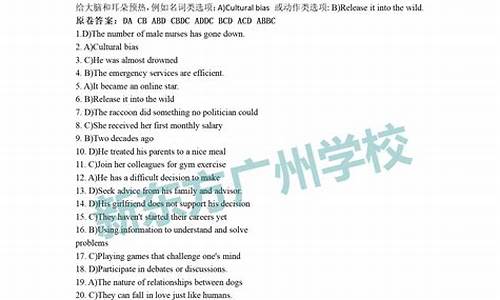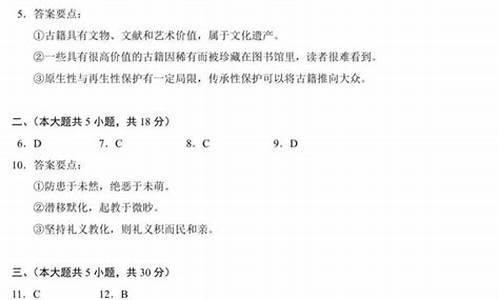您现在的位置是: 首页 > 分数线 分数线
2014高考英语听力答案,2014高考听力答案
tamoadmin 2024-05-20 人已围观
简介2014年6月英语四级听力答案:试卷一短文一16. D. Get key information by reading just once or twice.17. A. Choose one‘s own system of marking.18. B. By reviewing only the marked parts.19. D. Everybody needs some sleep for

2014年6月英语四级听力答案:试卷一短文一
16. D. Get key information by reading just once or twice.
17. A. Choose one's own system of marking.
18. B. By reviewing only the marked parts.
19. D. Everybody needs some sleep for survival.
20. C. It is a rare exception.
21. B. His mother's injury just before his birth.
22. C. She developed a strong interest in finance.
23. D. She inherited a big fortune from her father.
24. A. She was extremely mean with her money.
25. B. She built a hospital with her mother's money.
2014年6月英语四级听力答案点评:试卷一长对话
Conversation 1:
9. A. She had a job interview to attend.
点评:事实细节题。关键听取原文中“It’s just that she submitted a job application yesterday and the company asked her in for an interview today”.
10. C. Submit her roommate’s assignment.
点评:事实细节题加单词的同义替换。关键听取原文中“I’m calling to see whether it would be OK if I gave you her essay.”
11. A. Where Dr. Ellis’s office is located.
点评:事实细节题。关键听取原文中“And Dr. Ellis, one more thing, could you tell me where your office is?”
Conversation 2:
12. C. He can handle it quite well.
点评:同义替换原文内容“But it’s bearable now that I’ m used to it”。be used to 表示为习惯做某事。
13. B. The 6:30 train.
点评:细节题。重点听取原文中“It was terrible at first, especially getting up before dawn to catch that 6:30 train”
14. C. The time on the train is enjoyable.
点评:细节题加词性转换。重点听取原文中“But now I quite enjoy it.”
15. A. Reading newspapers.
点评:细节与词义替换。重点听取原文“In the morning, I just sit in comfort and read the papers to catch up with the news.”
2014年6月英语四级听力答案点评:试卷一短对话
短对话总评
这次英语四级听力短对话总体难度适中,主要考点仍然集中在对日常生活的理解上。一共8 题,其中第1题考察事实细节,3、4、6是对句子内涵的理解,2和5分别是对地点和原因的推断,7、8是对事实细节的推断。大家在做听力时,不要纠结在一两个生词上,一定要注意把握对话人的隐含义,才能做出准确推断。
答案及难词解释:
1. B .Use a ladder to help her reach the tea.
点评:事实细节题,主要听男士的意见Why don’t you use the ladder. strain v.表示拉伸,扭伤 strain your shoulder 拉伤肩膀
2. D. Outside an art gallery.
点评:推理判断题,从女士的“exhibition”与男士的“favorite painter”中推断出。
3. B. She does not quite agree with what the man said.
点评:推理判断题,从女士的评价中可以看出。
evaluation n. 表示评估价值 ;an unfair evaluation 有失公正的评价;
4. C. Doris fixed up some of the book shelves.
点评:推理判断题,从男士的“I got Doris to do some of them.”推断出答案。
注意shelf 复数形式是shelves
5. D. He has found a better position.
点评:事实细节题,主要听男生的陈述 “I’ve been offered a much better position with another firm”
firm在这里解释为:公司,企业。
6. A. They should finish the work as soon as possible.
点评:推理判断题,从男士的“But I think we should get it over with this weekend”可以得出。
7. D. The furniture the man bought is inexpensive.
点评:事实细节题,从男士的描述“dirt cheap”中可以得出。
dirt cheap 表示非常便宜。furnish v. 表示布置;陈设 n. furniture 家具。
8. B. The woman is waiting for a call.
点评:推理判断题,从男士的话中“I’ll let you know when he calls.”推断出答案。
2014年6月英语四级听力答案及点评:试卷一复合式听写部分
26. identical
27. approach
28. back and forth
29. opposite
30. indicates
31. referring to
32. parallel to
33. reserved
34. at a right angle
35. embarrassing
2014年福建省高考英语听力原文
Text 1
W: Excuse me. This is the address. How do I find it?
M: Right. You’ll need a street map. Here’s one, and I’ll show you where it is.
Text 2
W: Oh my! My car broke down, and I have to meet my aunt at the railway station before noon.
M: You’re lucky. I can drop you off on my way.
Text 3
W: Did you hear that Mr. Peterson is coming next week, Gordon?
M: Yes, so I called all the department heads to my office this morning. We need to give him reports on our program.
Text 4
W: I hope you like the book I lent you. I wasn’t sure if you’d be interested.
M: I had the same doubt at first. But once I started, I simply couldn’t put it down.
Text 5
W: What is going on? It’s May, and we still have to wear warm clothes.
M: Well, there’s some good news on the radio. You probably can wear shorts tomorrow.
Text 6
W: Harry, let’s play some ping-pong today.
M: I’d love to play a set or two, but my right arm hurts. I’ve decided to stop playing ping-pong until it feels better.
W: Well, how about going skating?
M: I’d like to, but my knee hurts, too.
W: Harry, stop making excuses! You’re just lazy.
M: No, I’m not! You know, there’s a basketball match on TV today. Let’s just stay home and watch it.
W: OK. You stay, and I’ll play with Helen.
Text 7
W: What do you want to do tonight?
M: How about going to the cinema? I should be home from work at 5:45. Then we can go out and eat before we see a film.
W: What do you want to see?
M: There’s a good art film at the Green House Cinema.
W: Let’s see…it starts at 6:15. I don’t think we can get there in time to see the beginning. How about the action film at the New State Cinema? It starts at 6:50. Perhaps the 7:00 one at the UME Cinema is even better. It stars Jackie Chan.
M: OK, that’s fine. I like him, too.
Text 8
M: Hey, Lucy. Do you have some time to talk about next week’s trip with me?
W: Sure, Dave.
M: OK. So, we’re leaving on Monday from Hartsfield International Airport, and returning on Friday. Do we take ourselves to the airport? Maybe we need to book a taxi, or just go by bus.
W: No, we don’t have to. The company car will pick us up and take us there.
M: Oh, that’s good. When?
W: Our flight leaves at 11:00 a.m., so they should pick us up between 8:00 and 9:00 a.m. Besides, the company pays for our trip, including hotel and food.
M: How much will that be?
W: Well, New York is a pretty expensive city. So, each of us will get $200 a day.
M: Oh, OK. Thanks for telling me that.
W: You’re welcome.
Text 9
W: Please sit down. Let’s see…you’re Mr. Smith. Is that correct?
M: Yes. John Smith.
W: And you’re interested in this job?
M: Yes, I am. I’ll graduate from college the coming June. My major is Chinese.
W: I see. Have you ever done any work in this field?
M: Yes, I used to be a tour guide for Chinese travellers.
W: Good. Now, how much money do you expect to have for a year?
M: From what I’ve read, it seems that a starting pay would be around $12,000 a year.
W: Here, you would start at $10,500 for the first year…a kind of training period. Then you would go to $15,000.
M: That sounds fair enough. What do you think are the chances for me to get a job here?
W: Well, I’m talking to three people today and four tomorrow. We’ll be hiring two people. You’ll hear from us sometime next month. Good luck! And thanks for coming in today.
Text 10
M: Well, I’d love to share with you my personal opinions on city life and life in small towns. I grew up in a small town until I was 18 and then moved to a big city, so I have experienced the good and bad sides of both. I never thought that I would like living in a big city, but I was wrong. After ten years of living in one, I can’t imagine ever living in a small town again. Surely small towns and big cities both have some problems in terms of transport. In a small town, you have to own a car to make life comfortable. You can’t get around without one because there isn’t any kind of public transport. Big cities generally have heavy traffic and expensive parking, but there you have a choice of taking public transport, which is cheaper than driving. So, if you don’t have a car, you’d better live in the city. I also love the exciting life in big cities. I can always enjoy a lot of films, concerts, and other wonderful shows. However, these things are not common in small towns. The final thing I like about large cities is that you can meet different kinds of people. However, you seldom find such a variety of people in a smaller town. I think that living in an area where everyone was just like me would quickly become dull. Of course, safety should be considered, and that’s one area where small towns are better than big cities. Still, I would rather be a bit more careful and live in a large city than to feel safe but dull.
第一节(共5小题,每小题1.5分,满分7.5分)
听下面5段对话。每段对话后有一个小题,从题中所给的A、B、C三个选项中选出最佳选项,并标在试卷的相应位置。听完每段对话后,你都有10秒种的时间来回答有关小题和阅读下一小题,每段对话仅读一遍。
例:How much is the shirt?
A. £19.15 B. £9.18 C. £9.15
答案是C。
1.What does the woman want to do?
A. Find a place. B. Buy a map. C. Get an address.
2.What does the man do for the woman?
A. Repair her car B. Give her a ride C. Pick up her aunt.
3.Who might Mr. Peterson be?
A. A new professor B. A department head C. A company director.
4. What does the man think of the book?
A. Quite difficult. B. Very interesting. C. Too simple.
5. What are the speakers talking about?
A. Weather B. Clothes C. News.
第二节(共15小题,每小题1.5分,满分22.5分)
听下面5段对话或独白,每段对话或独白后有几个小题,从题中所给的A、B、C三个选项中选出最佳选项,并标在试卷的相应位置。听每段对话或独白前,你将有时间阅读各个小题,每小题5秒钟;听完后,各小题给出5秒钟的作答时间。每段对话或独白读两遍。
听第6段材料,回答6、7小题。
6. Why is Harry unwilling to join the woman?
A. He has a pain in his knee.
B. He wants to watch TV.
C. he is too lazy.
7. What will the woman probably do next?
A. Stay at home.
B. Take Harry to hospital.
C. Do some exercise.
听第7段对话,回答8、9小题。
8. When will the man be home from work?
A. At 5:45 B. At 6:15 C. At 6:50
9. Where will the speakers go?
A. The Green House Cinema. B. The New State Cinema. C. The UME Cinema.
听第8段对话,回答第10至12题。
10. How will the speakers go to New York?
A. By air. B. By taxi. C. By bus.
11. Why are the speakers making the trip?
A. For business. B. For shopping. C. For holiday.
12. What is the probalbe relationship between the speakers?
A. Driver and passenger B. Husband and wife C. Fellow workers.
听第9段对话,回答第13至16题。
13. Where does this conversation probably take place?
A. In a restaurant. B. In an office. C. In a classroom.
14. What does John do now?
A. He’s a trainer. B. He’s a tour guide. C. He’s a college student.
15. How much can a new person earn for the first year?
A. $10,500. B. $12,000. C. $15,000.
16. How many people will the woman hire?
A. Four B. Three C. Two
听第10段材料,回答第17至20题。
17. How long has the speaker lived in a big city?
A. One year. B. Ten years. C. Eighteen years
18. What is the speaker’s opinion on public transport?
A. It’s comfortable B. It’s time-saving C. It’s cheap.
19. What is good about living in a small town?
A. It’s safer. B. It’s healthier. C. It’s more convenient.
20. What kind of life does the speaker seem to like most?
A. Busy. B. Colourful. C. Quiet.









